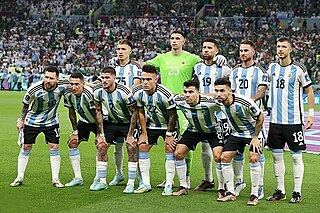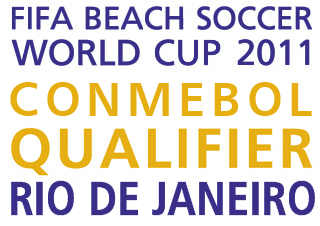
The FIFA World Cup, often simply called the World Cup, is an international association football competition between the senior men's national teams of the members of the Fédération Internationale de Football Association (FIFA), the sport's global governing body. The tournament has been held every four years since the inaugural tournament in 1930, with the exception of 1942 and 1946 due to the Second World War. The reigning champions are Argentina, who won their third title at the 2022 tournament.

The 2005 FIFA Beach Soccer World Cup was the first edition of the FIFA Beach Soccer World Cup, an international beach soccer competition contest by men's national teams and organized by FIFA. Overall, it was the 11th edition of a world cup in beach soccer since its establishment with the first Beach Soccer World Championships in 1995. It took place in at Copacabana Beach in Rio de Janeiro, Brazil, between 8 and 15 May.
The Beach Soccer World Championships was the premier international beach soccer competition contested by men's national teams between 1995 and 2004. It was replaced by the FIFA Beach Soccer World Cup.

The 2006 FIFA Beach Soccer World Cup was the second edition of the FIFA Beach Soccer World Cup, governed by FIFA. Overall, this was the 12th edition of a world cup in beach soccer since the establishment of the Beach Soccer World Championships which ran from 1995–2004 but was not governed by FIFA. It took place in Rio de Janeiro, Brazil, from 2–12 November 2006.

The 2007 FIFA Beach Soccer World Cup was the third edition of the FIFA Beach Soccer World Cup, governed by FIFA. Overall, this was the 13th edition of a world cup in beach soccer since the establishment of the Beach Soccer World Championships which ran from 1995 to 2004 but was not governed by FIFA. It took place in Rio de Janeiro, Brazil, from 2–11 November 2007.

The 2008 FIFA Beach Soccer World Cup was the fourth edition of the FIFA Beach Soccer World Cup, governed by FIFA. Overall, this was the 14th edition of a world cup in beach soccer since the establishment of the Beach Soccer World Championships which ran from 1995–2004 but was not governed by FIFA. It took place in Marseille, France, in the Plages du Prado from 17 to 27 July 2008. It was the first tournament to take place outside Brazil.

The 1995 Beach Soccer World Championships was the first edition of the Beach Soccer World Championships, the most prestigious competition in international beach soccer contested by men's national teams until 2005, when the competition was then replaced by the second iteration of a world cup in beach soccer, the better known FIFA Beach Soccer World Cup. It was organised by Brazilian sports agency Koch Tavares.
The 1996 Beach Soccer World Championships was the second edition of the Beach Soccer World Championships, the most prestigious competition in international beach soccer contested by men's national teams until 2005, when the competition was then replaced by the second iteration of a world cup in beach soccer, the better known FIFA Beach Soccer World Cup. It was organised by Brazilian sports agency Koch Tavares.
The 1997 Beach Soccer World Championships was the third edition of the Beach Soccer World Championships, the most prestigious competition in international beach soccer contested by men's national teams until 2005, when the competition was then replaced by the second iteration of a world cup in beach soccer, the better known FIFA Beach Soccer World Cup. It was organised by Brazilian sports agency Koch Tavares.
The 1999 Beach Soccer World Championships was the fifth edition of the Beach Soccer World Championships, the most prestigious competition in international beach soccer contested by men's national teams until 2005, when the competition was then replaced by the second iteration of a world cup in beach soccer, the better known FIFA Beach Soccer World Cup. It was organised by Brazilian sports agency Koch Tavares.
The 2000 Beach Soccer World Championships was the sixth edition of the Beach Soccer World Championships, the most prestigious competition in international beach soccer contested by men's national teams until 2005, when the competition was then replaced by the second iteration of a world cup in beach soccer, the better known FIFA Beach Soccer World Cup. It was organised by Brazilian sports agency Koch Tavares.

The 2009 FIFA Beach Soccer World Cup was the fifth edition of the FIFA Beach Soccer World Cup, governed by FIFA. Overall, this was the 15th edition of a world cup in beach soccer since the establishment of the Beach Soccer World Championships which ran from 1995 to 2004 but was not governed by FIFA. It took place in Dubai, the United Arab Emirates between 16 November and 22 November 2009. It was the second tournament to take place outside Brazil, first to be played in Asia, and the last tournament to take place on an annual basis.

The 2003 Beach Soccer World Championships was the ninth edition of the Beach Soccer World Championships, the most prestigious competition in international beach soccer contested by men's national teams until 2005, when the competition was then replaced by the second iteration of a world cup in beach soccer, the better known FIFA Beach Soccer World Cup. It was organized by Brazilian sports agency Koch Tavares in cooperation with and under the supervision of Beach Soccer Worldwide (BSWW), the sports governing body.
The 2004 Beach Soccer World Championships was the tenth and final edition of the Beach Soccer World Championships, the most prestigious competition in international beach soccer contested by men's national teams; the following year, the competition was replaced by the second iteration of a world cup in beach soccer, the better known FIFA Beach Soccer World Cup. It was organized by Brazilian sports agency Koch Tavares in cooperation with and under the supervision of Beach Soccer Worldwide (BSWW), the sports governing body.

The 2011 FIFA Beach Soccer World Cup was the sixth edition of the FIFA Beach Soccer World Cup, governed by FIFA. Overall, this was the 16th edition of a world cup in beach soccer since the establishment of the Beach Soccer World Championships which ran from 1995–2004 but was not governed by FIFA. It took place at the Stadio del Mare, a temporary stadium at the Marina di Ravenna in Ravenna, Italy, the third tournament to take place outside Brazil, which started on September 1 and ended on September 11, 2011. However this was the first tournament to take place under the new two year basis; now the FIFA Beach Soccer World Cup takes place once every two years. The tournament was confirmed in March 2010.

The 2011 FIFA Beach Soccer World Cup CONMEBOL qualifier, also later and commonly known as the 2011 South American Beach Soccer Championship, was the fourth Beach Soccer World Cup qualification championship for South America, held from July 31– August 7 on Copacabana beach in Rio de Janeiro, Brazil. The tournament was originally scheduled to take place from 7 – 14 May 2011.
The 2005 CONCACAF and CONMEBOL Beach Soccer Championship, also known as the 2005 FIFA Beach Soccer World Cup qualifiers for (CONCACAF and CONMEBOL), was the first beach soccer championship for the Americas, held in March 2005, in Rio de Janeiro, Brazil. Hosts Brazil won the championship, beating Uruguay in the final, whilst the United States beat Argentina in the third place play off to finish third and fourth respectively. These nations moved on to play in the 2005 FIFA Beach Soccer World Cup in Rio de Janeiro from May 8 to May 15.

The 2017 CONMEBOL qualifiers for the FIFA Beach Soccer World Cup, was the seventh edition of the Beach Soccer World Cup qualification championship contested by the men's national teams of South America to determine the best beach soccer nation on the continent, organised by CONMEBOL. The tournament acted as a qualifying event to the 2017 FIFA Beach Soccer World Cup, with the top three finishing nations progressing to the finals in the Bahamas.
The following were the scheduled events of association football for the year 2018 throughout the world.
The following were the events of association football for the year 2019 throughout the world.










